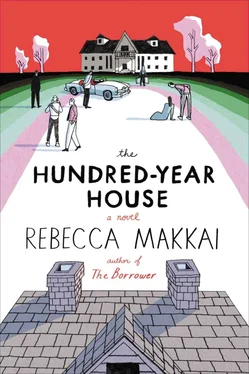His mouth was open, and he looked like a fish. He said, “I’ll take you.”
“The hell you will. Either ring Max or bring me the phone.”
“What will you say?”
“That I fell off the bed.”
“Grace, I love you.”
“I know that.”
“And you love me.”
“Yes. Yes.”
He sat on the ground and put his head between his knees, and started rocking like a little boy. Grace stood gingerly and went for the telephone herself.
Max took her in the Capri. There was Amy, owl-eyed at the coach house window as they crunched down the drive.
—
A hat with a little veil, combined with the sunglasses, hid the stitches and bandage quite well when she ventured out, even if she did look like an escapee from Hollywood. George disappeared for five straight days after that — he was gone by the time Grace and Max returned in the morning — and Grace passed the time by following Max on her bicycle. Now that she knew where he was headed she could hang behind quite a bit, and after he left the property he never seemed to look back.
Might she be in love with him? It was one explanation for this compulsion to follow his every move, but she doubted that was it. He wasn’t the type she’d enjoy making love to — he’d be too polite, too quiet, which had been the problem with all the boys back in Toronto. She thought of Lionel, who had kissed her wrist and wouldn’t stop asking what she wanted. “Do you like this? Tell me what to do. What do you want me to do?” The problem with George was that she could never be happy with a man who wasn’t George. She searched herself to see if she held any sort of physical longing for Max, and really she didn’t think so. But he was a nut she wanted to crack.
He was taking two classes: the one with the Bolsheviks (Grace thought for a while that it was Russian history, but one day as she listened at the door the professor talked about the Balkans, and she became less sure) and one on the novels of Thackeray and Dickens. She heard enough of that one that she became curious about Vanity Fair , which she’d never read, and scared up a copy from the Laurelfield library. Becky Sharp was a wicked heroine, and Grace loved her immediately. Becky was doomed, that was clear. No vice went unpunished in the nineteenth-century novel.
She never stayed more than ten minutes outside the classroom doors, afraid Max might one day head out to use the restroom and discover her. She found, though, that when she biked directly home, Max often didn’t return for two or three hours. Certainly the classes weren’t that long. In the English building was a smaller hallway off the main one, and she realized she could stand by the corner examining the framed map of Literary England without arousing much suspicion. She did that one Tuesday as the class let out. She was ready to run, but Max lingered by the door with the same blond boy he’d whispered to that first day in the history lecture. They walked together, shoulder to shoulder, down the stairs. Grace stayed and looked down from the window, and saw which way they walked: to the large building with ivy, talking together the whole time. After they’d passed through the double doors, she followed.
It was the library. She picked a direction and walked briskly past the front desk, only to find herself in a reference room with no one in it. She found a larger room with card catalogues, and a study area where the students sat smoking, but she didn’t see Max. Upstairs were study carrels and shelves packed thickly together. She supposed if Max saw her she could always pretend she’d been looking for some book. It wasn’t any odder for her to be here, after all, than for him to be.
A girl raced past and nearly knocked Grace over with her poodle skirt. Peering down a long aisle, Grace saw, on the far end, the blond boy, walking alone now. She went as far down the aisle as she dared, and managed to watch him through the last bit of shelf. He walked through a door and shut it. There were several such doors along the far wall, and through the open ones she could see very small rooms with desks. Her own college library had offered similar setups: for the girls who wanted no distractions, the ones with ambitious senior projects.
Not two feet in front of her, Max passed by, eyes down. He didn’t notice her. She watched as he entered the same room, and as the door once again clicked shut.
If it hadn’t been for that photograph, so fresh in her mind, it might have taken her quite a bit longer to figure it all out.
She stood there at the end of the aisle, just stood there, a long time, feeling like an all-around nitwit. She was humiliated that she’d been so fascinated by Max, that she’d liked how he looked at her. She wondered if the world were full of degenerates, Max and this boy and her father and the other man in the photograph, and who knew how many others, all around her, and she in the middle of it, blind and oblivious. Or maybe there was something connecting it all. Her father had told her that Max wasn’t to be dismissed under any circumstance. And maybe it was only because Max and her father frequented the same dark bars, the same alleys and closets. Max and her father, her father and Max. Yet they didn’t seem to care for each other a bit. Perhaps that wasn’t a requisite, in these types of relations. Or maybe he was simply afraid of what Max knew about him.
She knew she ought to leave. If Max found her there now , her face would betray her. She thought about that boy, no more than twenty, and how maybe she oughtn’t leave him alone there with a man twice his age, how the boy’s mother would have preferred Grace to break down the door and send him home at once, his luggage following after.
She went back to the ground floor and sat on one of the smoking couches where she could see the stairs. She held the Tribune open in front of her face. Max came down alone, twenty minutes later, and though she expected the boy would follow a few casual paces behind, he didn’t. Grace waited another twenty minutes, and then she walked upstairs and back through the aisles. She found the boy at a regular small study carrel, hunched over a textbook. There were other students, but not terribly near. She walked around the carrel, pretending to look for something, and she glanced at his face, at his prodigious eyebrows. He didn’t seem distressed, or even guilty — just wholly immersed in his studies.
“Excuse me,” she said, and he looked up. “I’m afraid I’m lost.”
He gave a sly smile and gestured around the room. “It’s the library,” he whispered.
“Yes.” She laughed. “And I — My husband is a trustee of the college, and he’s left me to fend for myself while he meets the dean. I got here, and I don’t even know what floor this is. All I’m looking for is the powder room.”
The boy stood and nodded. “Pleased to help a damsel in distress.” If she hadn’t known better, she’d have thought he was flirting.
She followed as slowly as she could, so she’d have time to think what to ask. “You look like a senior,” she said.
“Sophomore.” He stopped and extended his hand. “Sidney Cole of Indianapolis. Sid.”
“Amy Hall,” she said. “Of New York.” They continued walking. “And do you like it here?”
“Oh yes.” But she doubted he did at all. How could he, the poor thing? Boys like that never lasted anywhere long.
“People are friendly?”
“Enough are.”
She wanted to say something useful, but what? She had nothing to tell this boy about how to live his life. Besides, they had reached the ladies’ room door. “Well,” was all she could think of. “Thank you. Do take care of yourself, Sid.”
—
The Darrin was back, parked in the middle of the driveway and waiting for Max to store it. Grace picked up the mail and went directly to the attic, and hoped George at least wasn’t drunk enough to destroy things down below.
Читать дальше












